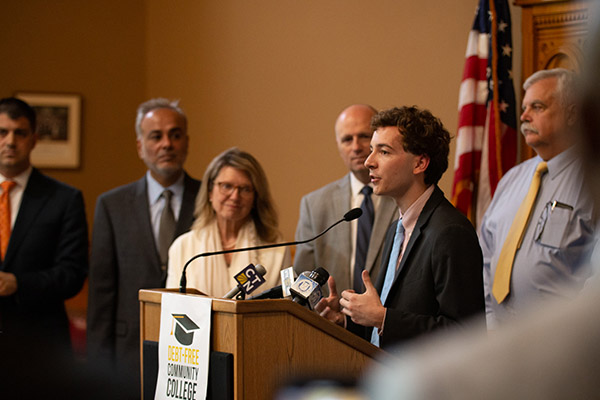Senator Anwar Cheers State Budget’s Creation Of Debt-Free Community College Program

Democratic leaders speak Tuesday on the benefits of an impending debt-free community college system.
HARTFORD, CT – Today, State Senator Saud Anwar (D-South Windsor) cheered the Senate’s approval of a state budget that expands access to higher education and will provide a ladder of opportunity through Connecticut’s community colleges. The budget will provide a roadmap to the state for debt-free community college.
“This was one of the most important priorities of this session. We have a responsibility to invest in our next generation,” said Sen. Anwar. “Students should be able to achieve their highest potential and should not be restricted based on their ability to afford education. I am thankful for Senator Haskell’s leadership as well as Representative Haddad, Senator Flexer and Representative Turco’s efforts in doing the groundwork to make this a reality. Connecticut’s future and economic development will depend on the workforce and this work will allow us to reach that goal.”
“Connecticut has the third-highest accumulated student loan debt in the country,” said Senate President Pro Tempore Martin Looney (D-New Haven). “This reality influences where college graduates decide to live and what careers they are able to pursue. When students are not confident residing and working in Connecticut, that concern has a ripple effect on our communities and our economy. This legislation will change that and allow students attending regional-technical colleges to graduate without debt and encourage them to start their careers in our state. It’s an enlightened policy and I’m pleased to see it included in the budget.”
“This is a great investment in the future of Connecticut,” said Senate Majority Leader Bob Duff (D-Norwalk). “When students can attend one of our regional community-technical colleges and graduate debt free, that influences their decision to live, work, or start a family in Connecticut. Community colleges are the backbone of our communities and help to create a workforce pipeline that prepares students for the 21st century economy. This legislation helps students who deserve to attend school without the burden of debt and benefits workers, employers, and our economy.”
“I appreciate leaders of the Higher Education Committee for working closely with the CSCU team on workable language that aligns with the Board of Regents’ goal of increasing access and affordability of higher education,” said Connecticut State Colleges and Universities (CSCU) President Mark Ojakian. “If passed, we will implement the program in time for the fall 2020 semester. Connecticut’s community colleges continue to be the most cost-effective option for students of all backgrounds to obtain a high quality education. I thank the legislature for their commitment to our public colleges and universities.”
As part of the state budget, high school graduates attending regional community-technical colleges will have the opportunity to graduate from those institutions without accruing debt starting in the second year of the biennial budget.
While the program will cost approximately $2 million to implement and $6.1 million in its first year, new students entering the community college system are expected to bring up to $7.6 million in new tuition revenue, partially from the additional federal funding.
Starting in the fall of 2020, students will receive credit for the first 72 credit hours they take while enrolled for the first three years they are enrolled, required to take 12 credits per semester. That requirement includes remedial courses. Students would be required to be in good academic standing and accept all available financial aid supplied to them.
Current projections say the investment in community college programs could increase enrollment by up to 2,310 students in the first year, additionally helping nearly 7,000 students receive education without paying tuition or fees.
This program further supports the state’s education systems by requiring students to submit the FAFSA, or Free Application for Federal Student Aid, form. By encouraging students to submit this form, the state then gains federal support, as a higher number of submitted forms provides Connecticut with additional government funding.
Supporters of debt-free community college include Connecticut Coalition for Achievement Now Executive Director Subira Gordon, who noted that for every dollar invested in public secondary education, states see returns of between $3 and $4. Further support came from Connecticut State Colleges and Universities President Mark Ojakian, Congress of Connecticut Community Colleges President Bryan R. Bonita, and several current and former Connecticut college students, who noted that the cost of public college education in Connecticut increased nearly three times faster than inflation from 1971 to 2019.
“To earn a 4-year degree, a student may have to take on $100,000 in debt,” said Timothy Bristol of Stratford, who recently graduated from Southern Connecticut State University with $32,366 in debt. “Compare that to 1971, where a student could get a four-year degree for around $40,000, adjusted for inflation.”
